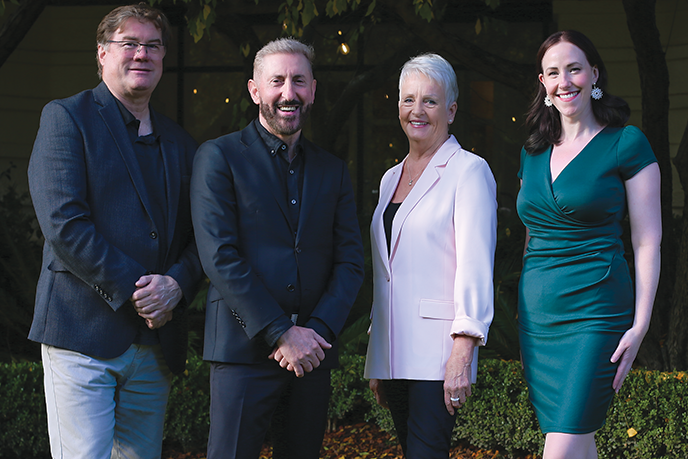
“I don’t use an ice bucket for white wine even if offered at a restaurant. It’s interesting to see how the wine changes in taste as it reaches a higher temperature, especially the amelioration of acid,” writes wine columnist RICHARD CALVER.
The temperature of the porridge had to be just right for Goldilocks to be happy. I’m the same with wine.

But before I get to that, I always disliked the Goldilocks story because she escaped from the bears and we never knew if there were consequences for her actions.
When I heard the story as a child it rankled that she escaped without any form of punishment and, strangely, it still does. She should have been strangled with bear hands.
One consequence of the Australian climate being hot and getting hotter means that often we serve white wines too cold and red wines way too warm.
How do we achieve the Goldilocks temperature for each? One of the most useful articles I have encountered on this subject was published by Elderton Wines in December last year entitled “Does serving temperature of your wine matter?”
This esteemed Barossa winery is famous for its shiraz with its Command Barossa Shiraz 2016, which I have tasted, being a standout. Anyway, the optimal temperature for drinking wine enhances the experience, so the Elderton advice is worth repeating.
Reminding us that refrigerator temperatures are generally at 3C-4C, the advice is to take white wine out of the fridge around 30 minutes before serving.
They advise the following serving temperatures for these varieties:
6-8ºC – sparkling, golden semillon (and dessert wines in general)
8-10ºC – riesling, chardonnay (unoaked), rosé
I’m pleased with this guidance because I keep my whites in a wine fridge, which I set at 10C so no waiting 30 minutes, although a quick five minutes in the fridge before serving a sparkling now seems warranted.
I also don’t use an ice bucket for white wine even if offered at a restaurant. It’s interesting to see how the wine changes in taste as it reaches a higher temperature, especially the amelioration of acid.
Elderton Wines also says that room temperature for red wines in Australia makes them way too hot: they call the traditional advice that red wines should be served at room temperature a myth that was derived from France where room temperature is likely to be circa 15C-18C.
Of course, at a barbecue in Australia the temperature is often double that number.
To get the temperature right they say: “You might need to pop your red into the fridge or ice bucket for a short time, or if you’ve got a wine fridge that is set for cellaring at a certain temperature, you might even need to let it warm up slightly before serving.”
The advice is to serve lighter reds at 12C-14C and more full-bodied reds, such as their shiraz, at 15C-18C.
This all sounds like good advice, but it’s not foolproof. Lots of us won’t know when the red wine has reached these optimal temperatures or be bothered checking.
So, I doff my cap to Taylors Wines. That company has been a pioneer in wine temperature education since 2014 when it first introduced its innovative thermo-chromatic ink technology on to some of its bottle labels, something I only recently discovered.
The ink technology used on the back label of Taylors Estate Range reads the temperature of the bottle to within 1°C and changes colour accordingly.
The sensor’s colour corresponds to a temperature scale on the back label, giving us a simple way to know when their wine is too cold, too warm, or, as Goldilocks would say, just right.
What happened when the three dwarfs and the seven bears met at a wine bar? They exchanged numbers.
Who can be trusted?
In a world of spin and confusion, there’s never been a more important time to support independent journalism in Canberra.
If you trust our work online and want to enforce the power of independent voices, I invite you to make a small contribution.
Every dollar of support is invested back into our journalism to help keep citynews.com.au strong and free.
Thank you,
Ian Meikle, editor



![Teacher Vanessa Jones has been living in Higgins since 2001, and while she loves the area, she says she is “fed up” with the neglectful ACT government.
The Higgins shops have been completely abandoned, says Vanessa, preventing the opportunity for residents to have a community-centred space to socialise.
They only received bins nine months ago, she says, and requests for a water station and repairs to the bus station have gone unanswered.
“It’s very, very slow,” says Vanessa.
“I asked for the zebra crossing on Fullagar [Crescent] to be repainted, and we had to wait about six or nine months.
“That’s just such a long time… we pay a lot of rates.”
Vanessa says assistance from the government only seems to go to communities with time-rich and assertive communities, leaving places such as Higgins, where the majority of households have both adults working full-time and English may not be the first language of the family, at an automatic disadvantage.
“If you’ve got two people working, paying a mortgage, raising two or three kids, they don’t have the time,” says Vanessa.
Vanessa says the lack of attention quieter places such as Higgins is receiving is starting to look a lot like favouritism.
Read the full article on our website citynews.com.au
#canberra #canberranews](https://citynews.com.au/wp-content/plugins/instagram-feed/img/placeholder.png)
Leave a Reply